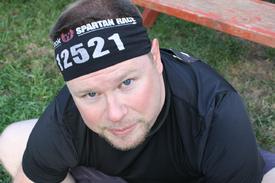does milk count as water?
Replies
-
hydration is hydration. The many things that have water in them, including milk, tea, juice, coffee, even cola all counts towards hydration. Calories in them is another subject all together and some actually are better at hydrating than others. I have tried many times getting used to drinking water all day, but I just cannot do it. Since this is for life, I have changed to warm tea and drink a ton of it with a splash of milk. I am very hydrated. If your pee is a light yellow and not really dark then you are good as gold. We do get a lot of hydration from the foods we eat too. If you get thirsty that means your body is dehydrated, if you don't then you are most likely doing a good job.0
-
... I thought milk was milk? It has calories, sodium, etc...
Water is water, everything else is whatever it is.
This0 -
*facepalm*0
-
 0
0 -
Water has one density, the density doesn't change dependent on state. The cup example is there are "less molecules" in the gas cup. If ther was the same molecules as the liquid cup then it would way the same. I think you're confused....
Quoted for the Lolz.
1 density?
My 10 years old knows better.
Here is the question. Why does ice float?
Because Water is what is known as H2O in a liquid state, Ice is known as H2O in a solid state. Water can't change state, H2O can.
The density of ice is 0.9167 g/cm³ at 0 °C, whereas water has a density of 0.9998 g/cm³ at the same temperature.
Notice the word "ice" and "water" so LOL
... And pressure.
You stated, "The density doesn't change dependent on state." You are now playing on semantics of water versus H2O. Nice try.
Your statement is wrong. Own it.0 -
I wouldn't count it as water either because it's simply not water. Tea and coffee, however, I do count as water.
Um, no. Tea and coffee are diuretics - they make you pee more water than you take in. They do not count.
Milk on the other hand absolutely counts. It's mostly water and it contains essential nutrients. The 8 glasses of water a day isn't really 8 glasses of water - it's 8 servings of 8oz of liquid. Fruit, soup, milk - they all count. You should drink more than that if you exercise a lot, sweat a lot, are in a hot climate, are pregnant, or anything else that might tend to dehydrate you.
Honestly, what shouldn't count are diet drinks like Crystal lite. The artificial sugars in most lite drinks will make you pee at least as much as a caffeinated drink will.0 -
OK, my understanding is that we agree, but the initial comment was not well phrased and lead to all this discussion. Still, it's interesting and more fun than what I'm supposed to be working on right now

Just a couple more comments before I finally get back to work:If you throw in environmental factors yes. For example what is pressure? It's a force, so yes it would cause an increase in weight.
Our environment is 1 atm as you know.
Ok, but I get the feeling from your response that you don't appreciate the importance of the "environmental factors". The density is NOT well defined unless the temperature and pressure are given or it's clarified that they are the same. This is especially true when you compare different phases (e.g. liquid/gas) of the same material.
in first glance the calculation is correct but you made a small mistake at the end: 1cup=1/4L not 4L! But we agree, you'd have ~300/4, about 75 cups of steam if 1 cup of water had evaporated and the T,P remained the same.((13.1326 mol.)( 0.08206 (L*atm)/(mol * K))(273.15k))/1 atm) = 292.12 liters or 1234.72cups.But Gases are just molecules that are excited, For example throw a can of soda in a fire what happens? The tempreture excites the molecules and causes them to move faster hitting the wall of the can faster with more speed, eventually it builds up enough speed to explode the can.
I won't elaborate but the statement in bold is also wrong Had I been grading I'd have taken some points off for that! What you mean is that molecules have higher kinetic energies, but they're not 'excited". That's something else
Had I been grading I'd have taken some points off for that! What you mean is that molecules have higher kinetic energies, but they're not 'excited". That's something else  Just clarifying how gases work, now to the topic. I think we're misinterpreting each other, what I am saying... If you do consume 1 cup of H2O(g) you're consuming the same amount of molecules of H2O(l). Yes there is more Volume within a given container with a gas, but there is also a lot more space, the molecules are just moving faster within the container taking up more volume, the volume of water doesn't change. What changes is he space between the water.
Just clarifying how gases work, now to the topic. I think we're misinterpreting each other, what I am saying... If you do consume 1 cup of H2O(g) you're consuming the same amount of molecules of H2O(l). Yes there is more Volume within a given container with a gas, but there is also a lot more space, the molecules are just moving faster within the container taking up more volume, the volume of water doesn't change. What changes is he space between the water.
Again, your phrasing is misleading. What you mean is If you do consume 1 cup of H2O that was liquid and then was all evaporated you're consuming the same amount of molecules of H2O(l)
With that I think we all agree. In other words, the same mass of water contains the same molecules independent of what its phase is. I think this is what you were trying to say but got mixed up with volumes etc I saw the page what you posted, and yes that's not what I am talking about. In chemistry Dimensional analysis (also called Factor-Label Method or the Unit Factor Method) is a problem-solving method that uses the fact that any number or expression can be multiplied by one without changing its value. It is a useful technique. The only danger is that you may end up thinking that chemistry is simply a math problem - which it definitely is not.
I saw the page what you posted, and yes that's not what I am talking about. In chemistry Dimensional analysis (also called Factor-Label Method or the Unit Factor Method) is a problem-solving method that uses the fact that any number or expression can be multiplied by one without changing its value. It is a useful technique. The only danger is that you may end up thinking that chemistry is simply a math problem - which it definitely is not.
Interesting, I didn't know this had a name! Actually now that I think a bit more about it, it is in some way a very simple form of dimensional analysis and I suppose that's why it got this name. But it's still a misnomer. Out of curiosity and if you don't mind me asking, at which level is this taught (high school, college)? I'm not American but I'm somewhat familiar with the educational system over there.
Edit: I was going for a couple quick comments and close the issue, but ended up with a huge sentence by sentence reply. Sorry for that!0 -
If tea didn't count as water my Mum would be dead lol unless wine counts? :P0
-
Milk is 85-90% water. http://wiki.answers.com/Q/What_percentage_of_milk_is_water
You can get "water" in many different ways.
Edit: The 8 glasses of water recommendation is an arbitrary number. It does not take into account water you get from food. The climate where you live. The energy that you expend daily. To much water can make your kidneys work harder than they need to. No one knows how much to much water is. Just like no one really knows how much water is required daily.
you're my hero.0 -
The subject is the water in milk, it's not like we're going to be examining this on mars or 4 miles below sea level.
I don't agree, I think it's important to be as clear and precise as possible when we talk science so that there are no misunderstandings. It took us several posts to realize that when you wrote "volume" you meant "mass". There are many ways to have pressure different than the atmospheric one, the simplest example being the can of soda you mentioned earlier.The answer results in 292.12L. since all the units cancel only thing left is Liters. So the answer from the calculation is 292.12L. Type in 292.12L in to google how many cups is that?
oh, that's my bad, I mixed that up. Sorry, you're right about that.Excitation is an elevation in energy level above an arbitrary baseline energy state. Atoms that are excited have a higher energy state. Kinetic energy of an object is the energy which it possesses due to its motion. With out energy there would be no motion, with no motion there will be no excited state. For example melting ice with fire. There is very little kinetic energy or excitement in ice, turn up the heat and kinetic energy and excitement increases. This was an exact quote i remember from a lecture a while back from a professor who graduated from Berkeley in chemistry. "Gases are excited molecules."
In that context it is clear what you mean, but the phrase is problematic because an "excited molecule" means something very specific and completely different when you know quantum mechanics/quantum chemistry. I used to TA such courses for several years and sort of took it for granted, but If you haven't had such a class, then ignore my comment, what you said is perfectly fine.Well I am majoring in chemistry and computer science, so my first chemistry course was in college. It was "Introduction To chemistry." This is where we learned dimensional analysis. It was an introductory course, so I would assume they teach it in high school chemistry course.
I see, that makes sense.0 -
You should not drink milk period, our bodies have not evolved yet for us to be used to this unnatural product. Also, if you are serious about working out, it increases the lactic acid build up in your muscles. Good luck.0
-
Milk is not water.0
-
You should not drink milk period, our bodies have not evolved yet for us to be used to this unnatural product. Also, if you are serious about working out, it increases the lactic acid build up in your muscles. Good luck.
WTF? Since when is milk an unnatural product? We didn't breed the cows to produce milk. They just do. As for that matter, is mothers milk an unnatural product?0 -
i still drink about 2 waterbottles of water every day but i also drink 3 glasses of milkDrink Water its important
2 bottles a day?? are you working out? I drink more then that just at the gym0 -
Um, no. Tea and coffee are diuretics - they make you pee more water than you take in. They do not count.
Hi. Welcome to the thread. We disproved this a few pages ago. Perhaps you and the others would like to catch up?0 -
i'll bump my ticker up one if i drink a ton of milk(pending on skim,2%, etc.) but, you should seriously consider drinking more water than two bottles0
-
if you are counting fluid intake.. yes you would. When in hospital and they are watching what fluids you take in, they count... water, milk, juice, pop, coffee, tea, soup, ice cream, apple sauce, jello, yogurt.0
-
I would count milk as a source of water, if I drank it. Almost everything we eat/drink contains water that is counted towards your daily hydration.
I don't count soda, coffee, some juices and some teas. Only because of the sugar/caffeine content as this can counteract some/all? (no idea which) of the hydration factor. The 8 glasses a day is a guide only and not a legit rule.
I used to have access to a very complicated scientific calculator for water intake but alas I lost it years ago. At the time I weighed 94 lbs and I didn't even need close to 8 glasses of water. (as it accounts for a general percentage of food/liquid intake).0 -
I think this has been commented to infinity, but I'm going to throw in my 2 cents anyway...
I don't count my skim milk intake towards my hydration intake (although I'm leaning towards the "do it" side of the argument). I don't count sodas, regular (caffeinated) tea, juices, green tea (again - caffeine), etc. However, I keep a jar of decaf artificially sweetened tea in my fridge and I DO count that and "crystal light"-type drink mixes, but only up to 4 glasses per day. I still try to make the majority of my liquids water.
Side note: I'm combining MFP with another plan that allows this type of hydration (up to 4 glasses of zero calorie, decaffeinated liquids).
And going back to the pee comparison: totally agree. If it's straw-colored or lighter, I know I'm good! (But I still don't drink it!!!)0 -
when I'm on a dive boat, I try not to drink too much water as peeing in my dry suit is fun for the first few minutes and then not so good. peeing off the back of the transom during a surface interval is just too damn hard. I eat fruit instead to get fluids. Then at the end of the day I drink beer.
will I die?0 -
Sorry, I should have clarified better. Someone who routinely drinks coffee may build a tolerance to it so it will not cause any form of dehydration. However, someone who does not drink coffee regularly has a good chance of becomming dehydrated. So it is important to remember to drink water if you are not a regular coffee drinker.0
-
My god. :sad:
I think there are as many uneducated people on this site as MySpace.
This site is MySpace trying to lose weight.
So much fail as my daughter would say...0 -
I post only to move ths back to the top. because it's fun.
oh, and I'm enjoying a loca moca java this morning. I was thirsty before I drank it, but am not now. does this mean it is hydrating me, or am I now more dehydrated than when I woke up because it isn't really a liquid, there are calories in this can and also scary, scary caffeine?0 -
Yes. Sooner or later, we will all die.when I'm on a dive boat, I try not to drink too much water as peeing in my dry suit is fun for the first few minutes and then not so good. peeing off the back of the transom during a surface interval is just too damn hard. I eat fruit instead to get fluids. Then at the end of the day I drink beer.
will I die?0 -
And people wonder why they have trouble losing weight and getting into shape!! 7 pages of arguing over whether milk is hydrating?? Of course it is. Better not to get hung up in the little things and make it too complicated.
Eat less than you burn at a reasonable deficit
Eat good macros with nutrient dense foods
Stay hydrated
Move more
'nuff said!0 -
If tea didn't count as water my Mum would be dead lol unless wine counts? :P
I think my mom and sister would agree about the wine.... LOL0 -
This thread contains more misinformation than most MFP threads.
Why do people continue to post that milk is not water and cling to the drink 8 cups of plain water a day myth? Milk is not water but it contains water. I think there should be a requirement to read every post before posting a reply.
All beverages with the except of some very high alcohol content alcohol have water in them. Most food has a percentage of water. Some very high. You could never drink a liquid and still be adequately hydrated.
The color of your pee can be a indicator of hydration but not always. Certain foods can influence this. For a while I was taking a multi-vitamin that made my pee a fluorescent yellow. It was kind of fun.
Your body is very good at regulating water. Conserving when it needs to and dumping excess when there is to much. Excessive amounts of water do not boost metabolism, flush toxins from your body, or cause weight loss. Excessive water can overwork your kidneys. Adequate hydration is important, 8 glasses a day is an arbitrary number. Their is a benefit to water during weight loss in that it can make you less hungry or make you feel more full.0 -
Did you mean if milk counts towards your fluid intake?.
Yes it does. And so does any other liquid you drink except for alcoholic drinks.
In fact, milk is a great post workout drink.
Post workout nutrition is crucial for muscle recovery & rehydration. The common advice is to have whey after a weight lifting session because it's a fast protein. You want to get protein in your muscles as fast as you can for recovery.
Truth or marketing from supplement companies? Fact is that many weight lifters have used milk as a post workout drink for years.
Milk Content. 1 cup (250ml) whole milk contains 8g protein, 13g carbs & 8g fat for a total of 150kcal. 1 cup also has 290mg calcium & 107g sodium. This combo makes milk perfect for lean body mass gains & recovery. Full content:
Casein. Slow digesting protein. Milk consists for 80% of casein, a dairy protein that keeps you full longer and helps fat loss & muscle repair.
Whey. Fast digesting protein. Milk consists for 20% of whey which helps muscle repair. This is the same kind of whey you find in protein shakes.
BCAA. Milk is rich in branched chain amino acids : leucine, isoleucine and valine. A diet rich in protein, especially dairy protein like milk, will get you plenty of BCAAs. No need to waste your money on supplements.
Carbs. Milk contains lactose. Your body uses this sugar to replenish your energy stores. Some can't digest lactose. Check the tips at the bottom.
Fat. Unless you go fat-free, milk contains 1 to 3g fat per 100ml. Fats digest slowly and keep you full longer, thus decreasing hunger.
Calcium. Dairy calcium increases fat loss & improves bone health. The latter is especially important if you're a woman (osteoporosis).
Water. Milk is about 87% water. Proper hydration improves muscle recovery and can increase strength by preventing fatigue & stalling.
Electrolytes. Milk contains sodium & potassium. These minerals improve re-hydration by retaining the fluids you consume post workout.
Nutrients. Biotin, magnesium, vitamin A, vitamin B-12, vitamin D, vitamin K, riboflavin and many others (naturally or through fortification).
5 Reasons You Should Drink Milk Post Workout.
Muscle Gains. Research shows a mix of slow and fast digesting protein is superior for lean body mass gains. Milk is 80% casein, 20% whey.
Fat Loss. Dairy calcium increases fat loss. The fat in milk keeps you full longer which decreases hunger and thus helps you to lose fat.
Recovery. Milk is a fluid and has electrolytes. Research shows milk is superior to water and sport drinks for rehydration post workout.
Cheap. When you consider the protein (whey/casein/BCAA) and calorie content of milk, it's one of the cheapest foods available.
Easy. Milk requires zero preparation. 1 quarter (1 liter) milk can be a perfect post workout meal depending on your daily caloric needs.0 -
I would honestly treat milk as a food and not as water. I rarely drink calories (as much as I can help it). Four liters of water a day though works for me.0
-
let's keep it going, folks. I know we can get this topic to roll over if we try hard enough.
 0
0
This discussion has been closed.
Categories
- All Categories
- 1.4M Health, Wellness and Goals
- 398.5K Introduce Yourself
- 44.7K Getting Started
- 261K Health and Weight Loss
- 176.4K Food and Nutrition
- 47.7K Recipes
- 233K Fitness and Exercise
- 462 Sleep, Mindfulness and Overall Wellness
- 6.5K Goal: Maintaining Weight
- 8.7K Goal: Gaining Weight and Body Building
- 153.5K Motivation and Support
- 8.4K Challenges
- 1.4K Debate Club
- 96.5K Chit-Chat
- 2.6K Fun and Games
- 4.8K MyFitnessPal Information
- 17 News and Announcements
- 21 MyFitnessPal Academy
- 1.5K Feature Suggestions and Ideas
- 3.2K MyFitnessPal Tech Support Questions




















